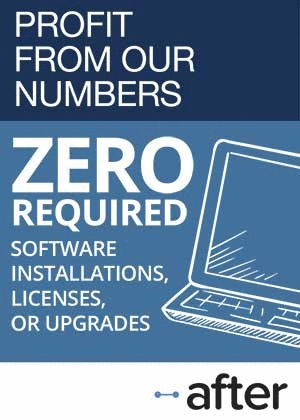Extended Warranty Solution:
ServiceBench aims new service contract solution at manufacturers, retailers, dealers and distributors of appliances, HVAC, fitness equipment, and other underserved markets. Goodman Manufacturing and Icon Health & Fitness are the first to sign up. Rainmaker Systems to help with telemarketing.
The best time and place to sell an extended warranty is at the time and place where the attached product is purchased. Conventional wisdom is that if the customer gets out the door without buying a contract, they're not likely to come back and buy one later.
The retailer therefore has the first and best shot at signing the customer, which explains the point-of-sale pressure many customers get from the salesman and/or cashier. But once the customer exits the building without having bought a warranty, it's open season for manufacturers, banks, insurance companies, utilities, and others that might want to take a second shot.
Extended warranties, also called service contracts, sell best for automobiles, computers, and consumer electronics. They're less prevalent but widely available for appliances, power tools, sports equipment, and medical equipment. They're ubiquitous in retail (Costco and Walgreens are the last holdouts), common among the home improvement chain stores, but they're underachievers in the direct and dealer channels.
Giving OEMs a Second Chance
ServiceBench Inc., which made its name connecting appliance manufacturers with retailers and repair services on an easy-to-use network, has put together an extended warranty solution that will help give manufacturers a second chance to sell a service contract to those who didn't buy them at retail, and will give appliance dealers and distributors a contract pricing and management capability that can put them into the business.

Michael Dering, president and CEO of ServiceBench, said he's not really aiming at the electronics retailers or auto dealers that are already well-served by third-party administrators of extended warranties and vehicle service contracts. He's not looking to turn ServiceBench into yet another TPA, and he's not looking for ways to pit manufacturers against their retailers.
"There are a lot of other channels, and a lot of other verticals that would like to participate in extended warranty -- not only for the profit, but also for customer loyalty and finding out where the product is going," Dering said. "But one of the reasons why they couldn't do it is because of their internal systems." They're simply not set up to sell or administer service contracts, he suggests.
ServiceBench customers such as Goodman Manufacturing Co. L.P. already use the ServiceBench platform to process warranty claims. Why not enhance it to handle extended warranty also? The ServiceBench platform already manages the dispatch of repair technicians and already aggregates all that data into a reportable and analyzable form. And the connectivity already exists between the manufacturer, the sales channel, parts distributors, service providers, and claims administrators. Therefore, many of the required ingredients are already in place.
"Dealers and distributors that sell products on behalf of OEMs now have a chance to sell service agreements that are a lot easier to understand," Dering said. "These service providers and distributors are already used to going into our system to get dispatches, file claims, receive payments, check on surveys and scorecards, and get some analytics out of us. Now, we're making the service contract part of the selling and servicing process that they work with."
It's Not Just Longer Warranties
But hold on, there's more to extended warranty than just the added years of coverage. First, extended warranties are sold, so the system must deal with prices, revenue recognition, insurance underwriting, sales commissions, profits, and ultimately taxes, along with the usual claims and accruals. Second, the product being sold will be regulated on a state level, so there will be a myriad of insurance laws to be followed and a mountain of paperwork to be filed.
It's enough to worry many manufacturers to the point that they leave the extended warranty market to the retailers, TPAs, and insurance companies that know it so well. If the retailer doesn't sell the customer, probably nobody will be in a position to take that second shot, because the manufacturer just isn't set up to sell service contracts.
ServiceBench already works with major retailers who use its claims recovery product, helping to move warranty claims data from the retailer to the manufacturer. When a service call comes into the network, ServiceBench determines whether it's covered by a product warranty, extended warranty, or if it's a customer-pay, and routes the paperwork accordingly. If the repair is covered by a product warranty, ServiceBench is going to help the retailer collect the money from the manufacturer.
ServiceBench also works with major third party administrators, helping to adjudicate warranty claims they file with any of a hundred OEMs that use the network. Some TPAs also rely on ServiceBench to help them with the scheduling and dispatch of service technicians. Others do that themselves. But ServiceBench doesn't get involved with any of their purely extended warranty business -- just the part that involves a manufacturer's warranty claim.
Aiming at a Different Segment
"We think our sweet spot is this large, unfulfilled market that is not tapped through the retail space," he said, either because the product was sold by a dealer or distributor that doesn't offer extended warranties, or because the buyer declined to buy the retailer's extended warranty offer.
Dering said ServiceBench has no intentions to try and displace the TPAs already working with retailers and manufacturers. This is more of an offer for the "have nots" at the other extreme: OEMs, dealers, and distributors who have not historically been in the extended warranty business.
"We are not a TPA, because basically, we are just the software and the platform underneath it that manages the whole process," he said. "TPAs have call centers and make solicitations. We don't do any of that." However, ServiceBench is partnering with Rainmaker Systems Inc. to provide solicitation services to manufacturers that need them (see "The Rainmaker Story" below for more).
Dering said the ServiceBench network is now processing more than 36 million transactions per year, and is pushing 600,000 to 800,000 pages of information per day. "We probably have more manufacturers using our software system to process claims than anybody else in the world," he said.
"Now we're taking that same concept over to the extended warranty side for the manufacturers," Dering said. As those product warranties expire, the manufacturers can take a second shot at selling the consumer an extended warranty. And they have a second chance to remain connected to the consumer, and to the product. If the product should break during the extended warranty period, the manufacturer can track the parts used and can lengthen the window for analysis. As the product gets old and begins to wear out, the manufacturer can suggest an upgrade or replacement. It enhances loyalty to the brand by strengthening the OEM's loyalty to the customer.
"When you go into the HVAC vertical, the retailers are usually distributors or service providers themselves. So they're not really selling service agreements, because of the complexity of it," Dering added. "We're going to work with the OEMs to help their dealers or distributors sell extended warranties that benefit the dealer/distributor and the OEM."
The sad truth is, though, if it were that easy to sell extended warranties, everyone would already be doing it. Manufacturer usually already have a service network and a parts management system in place, so in that respect, extended warranties are just like product warranties, only longer. But there's much more to consider. To sell extended warranties, a manufacturer would need a call center and a telemarketing ability of some kind. These contracts don't sell themselves. If you think it's tricky for a retailer to first sell a customer on a product's quality and then turn around and make them worried enough about the risks that they want to buy insurance, imagine how difficult it is for a manufacturer to do it.
Help with State Law Compliance
The manufacturer is also going to need legal advice and assistance with state insurance law compliance. This is an enormous task. Terms and conditions will be different from state to state -- see the fine print at the end of any national contract for some of the details. The manufacturer may also want or need to insure the risk in some states, so an underwriter will sometimes need to be involved. And of course the manufacturer will need advice on contract pricing, to make sure they aren't unwittingly selling extended warranties below cost.
Michael Bailey, the director of extended warranty solutions at ServiceBench, outlined some of the compliance challenges. "There are 30 states that you have to do some level of filing in," he said. "That can be as simple as letting the state be aware that you're selling an extended warranty via a reseller or direct to consumers in their states. In Oklahoma and Florida, you have rather lengthy quarterly submissions that you have to make."
One of those applications has 50 pages, Bailey said. Another asks for data on every single contract sold in the state, including the retail price paid by the consumer. Some want financial statements from the seller's corporation and a list of its directors. Some require contracts be backed by insurance; others do not. One wants a list of all complaints received by the local Better Business Bureau.
Florida requires the extended warranty seller to set a new division of their insurance company that's based in the state. Then a director of the company needs to go to the police department of the county in which that insurance company is based, to be photographed and fingerprinted. In addition, there are rules about maintaining reserves within the state.
"We'll be able to provide all the contractual information," Bailey said. "We have copies of these state reports, so we have designed by state what they need to pull from the sale of the extended warranty contract. That is all fed into their financials. And then they need to add their own quarterly statement, their list of directors, their Better Business Bureau hits, and the funding information that the states may want."
With all these reporting and disclosure requirements, why would any manufacturer want to run their own extended warranty sales program? "It's about control," Bailey said. "You can control the entire program, control the entire customer experience, and control the information.
Contract Pricing and Forecasting
"And with us, they'll be able to do their own actuary services, and their own loss cost analysis in our analytics," he added. "That will show them pricing. That will show them trend analysis on claims. And we have a forecasting capability that can help them identify problem SKUs and problem parts. You now have the same reporting as an OEM that's using us for their Day One coverage. But now you have the same reporting and data structures for the entire lifecycle of the product."
Bailey said this offering is likely to appeal to manufacturers who want to run their own extended warranty program but found the task too daunting to try completely on their own. "People who today are doing their own extended warranty programs," he said, "we'll help them do it a lot better."
For instance, the ServiceBench system could help an OEM or Rainmaker put together and price an offer that covers a six-year-old dishwasher, a four-year-old range, a three-year-old washer, and a brand new refrigerator. If the consumer wants to take the dishwasher out of the bundle, the system can strip out that item. And the customer can choose between "gold," "silver" and "bronze" levels of service, while they're on the phone with the seller.
Conversely, the ServiceBench system is not likely to appeal much to manufacturers that prefer to outsource as much as possible to TPAs. Nor is it likely to appeal to manufacturers that prefer to leave extended warranty matters up to their retailers to handle.
Wealth of Analytics
Dering said that when the day is done, ServiceBench has a wealth of data that OEMs can then analyze. "Our analytics are very powerful. There is a lot of data going through, and the OEM can slice and dice the information any way they want. They can do it by contract, by model, by brand, by plant, by consumer, by bundle. They can look geographically, and see how their products are affected by humidity. [They can see] which service providers are doing the best work for them. And they can go into root cause analysis of breakages, or service incidents, or customer dissatisfaction," he said.
The big difference is what the OEMs used to analyze was just the data they gathered over the first year or two of the initial factory warranty period. Now, as the extended warranty data is compiled, the OEMs can analyze additional years.
The first announced customers for the ServiceBench extended warranty solution are Goodman Manufacturing and Icon Health & Fitness Inc. Goodman is the second largest manufacturer in the U.S. of HVAC equipment. They manufacture products under the Goodman and Amana brand names. Icon is a $1.2 B manufacturer of fitness equipment including brands such as NordicTrack, HealthRider, and Weider. It also licenses the Reebok and Gold's Gym brands.
The ServiceBench solution was developed more or less at the request of Goodman, according to Rachel Cater, manager of the HVAC manufacturer's Extended Services Department. "Because the [product warranty] claims were flowing through ServiceBench," she said, "it seemed to make sense on our side to have the [service] contracts set up in that same system. It becomes a one-stop place, where the contract information is there and so are the claims. It integrated all the data."
Maintaining Control
Cater said Goodman considered outsourcing the whole operation to a TPA, but decided against that course of action so it could maintain control. "We feel we can provide better customer service and build better brand loyalty by authorizing claim payments ourselves and making a decision whether to pay for things that fall into a grey fuzzy area," she said. "We like to think that the terms and conditions are very black and white, and obviously they're written to be that way. But many times there are claims that fall into a questionable area, and we wanted to retain control and be the decision-maker as to how or whether we were going to compensate those."
The contract management aspect, she added, is extremely important to Goodman. "We need to have great documentation on all of our in-force contracts. And we need good records so we can report to the regulators about our in-force contracts. We were using a system in-house to keep those records, and there were some aspects of it that were difficult for us to manage. The system that we were using did not provide us with good reporting capabilities. And we needed an analysis tool to be able to make sure we were pricing things and marketing them appropriately."
Cater said she expects to have all of Goodman's distributors using the ServiceBench extended warranty solution by the end of August. "Very shortly thereafter, dealers will be able to log into ServiceBench, and enter the model number and serial number of the equipment they want to provide coverage on. The system will show all the types of coverage available for that particular piece of equipment. They'll be able to add the coverage to a shopping cart, purchase the contract, print it, and provide a copy to the end consumer," she said.
Goodman will do its own compliance with help from ServiceBench. Cater said because that task is so complex and time-consuming, there would be a significant cost to outsourcing it. But by keeping it internal, Goodman can keep costs down, and therefore can offer service agreements at a lower price, she said.
Help with Sales Campaigns
Solicitation is a different story. Companies such as Rainmaker Systems are set up to sell extended warranties to a database of a company's own prospects, and to keep a sales commission along the way. Michael Silton, CEO of Rainmaker, said the question comes down to skill sets and specialization. "Rainmaker is very focused on the revenue side of the equation" in the service contract and extended warranty business, he said. "Our job is to bring customer data and our proprietary technology together to drive more revenue for our clients. And it's that experience and our understanding of the buying behavior combined with our proprietary Web-based technology that allows us to interact cost-effectively with customers."
John Estrada, chairman and chief operating officer of ServiceBench, agreed that it's a matter of specialization. "At heart, they're a marketing firm," he said of Rainmaker. "They'll put the material together. They'll put together customer-facing Web sites. And they'll go through the solicitation, either over the phone or via mail."
Dering said Rainmaker and ServiceBench first discussed the possibility of working together at the end of 2006. This year, they've spent six months going through trials and tests of the customer data exchanges, making sure everything would work correctly. "Now we're starting to take them in to our customers," Dering said, because those tests have gone so well and they are confident they can work together with each other and with their clients.
The Rainmaker Story: Already working behind the scenes for both Dell and HP, the company is a specialist at selling extended warranties on behalf of computer manufacturers.
Silton said network interoperability is absolutely required in a partnership such as this. "In order to be able to effectively execute on these kinds of programs and drive the most revenue, the availability of data is your most important starting point. One of the things that ServiceBench has done an excellent job of is getting a hold of that data and aggregating it, because of the work that they do. And so through our technology integration with ServiceBench's applications, we're able to help clients that we share in common more effectively," he said.
"We've spent a fair amount of time working with ServiceBench making sure that we have the process in place," he added. "We've been at this business for a good while now. ServiceBench has been at their part of the business for a while. So coming together, I think we'll be able to provide a seamless experience for our common customers."
Silton said Rainmaker's job begins with that solicitation and ends with the payment. In that respect, his company can fit right in to situations where a ServiceBench customer wants to bring in outside experts for help with sales. The OEM still retains the control of the customer and the contract. But they won't need to set up a telemarketing effort to contact them in the first place.
Rainmaker is in a position, he noted, where it can either sell extended warranties directly to an OEM's customers, or it can help that OEM's dealers and distributors do so. "It's not all one homogeneous marketplace. Customers are not all the same. Nor do customers all buy in the same manner. One of the things Rainmaker has built up over the last ten years is the flexibility of how our communications programs work, depending on how the buying cycle is," he said.
"Our job is to make sure that every person who has a product knows that they can extend their warranty and make sure that they're given an easy way to make that happen," Silton added. Most of Rainmaker's clients are in the computer and telecom industries, so it's looking to ServiceBench to give it an introduction to additional areas such as appliance and HVAC, he said.
Extended Warranty Sales Focus
Taken together, Rainmaker's service contract sales commissions account for just under 60% of the company's total revenue. Most of the balance comes from lead generation services. Rainmaker's total revenue doubled from 2004 to 2005 and was up another 52% in 2006 to $48.9 million. A string of annual losses also came to an end last year with a net profit of $3.4 million declared.
Last year, Dell Inc. accounted for 38% of Rainmaker's revenue, and Hewlett-Packard Co. accounted for another 10% of revenue. Others listed as major clients on the company's Web site include Sun Microsystems, IBM, Quantum, Sony, AT&T Cingular, and Sprint.
In its annual report, Rainmaker describes itself as follows:
- We deliver revenue from the sale of extended warranties, subscription renewals and service contract sales. By keeping more customers under contract and by focusing on getting customers onto premium levels of support, we seek to maximize the revenue available from a client�s existing customers, as well as improve customer satisfaction so if a maintenance or service issue arises, our client�s customer is taken care of. Since all of the communications are under a client�s brand we are also reinforcing that brand with their existing customers. We seek to generate additional sales and cultivate closer customer relationships through innovative sales and marketing programs that include:
- Website Portals and E-mail Interaction. Our client-branded websites and e-commerce portals combined with e-mail interaction allow our clients� customers to obtain key information and purchase online. We develop, host and operate websites that reflect the look and feel of our clients� corporate branding. E-mail marketing campaigns include links to microsites, or personalized web portals, which alert our clients� customers of product enhancements, special promotions or upcoming renewal dates. When they visit the microsite, customers can view a secure, personalized listing of the services or add-on products associated with the initial products they have purchased from our clients. The microsite gives the customer the ability to view the service or product offerings, customize a quote, enter in its credit card information and transact an online order.
- Channel Enablement. Our channel enablement services include a leading proprietary hosted technology portal which helps our clients and their resellers in managing their customer base and selling software license subscription renewals. As a result of increasing reliance on resellers, our clients need to more effectively and profitably sell services through their channel partners. Furthermore, the complexities involved in managing and selling services generally exceed the capabilities of a traditional reseller. We believe that by providing our platform to our clients� resellers, our clients generate more service revenue through their channel, increasing the revenue for themselves and the reseller. Our channel solution provides direct marketing, reseller support, management services and telesales support to improve the end customer experience while also supporting the channel partners.
- Direct Mail Marketing. In addition to Internet and e-mail, we use sophisticated direct mail marketing programs. These campaigns alert our clients� customers to services and products, special promotions and renewal opportunities, which direct them to contact our telesales team, to purchase through our client-branded e-commerce sites or to transact through the mail.
- Personal Assistance and Telesales. Our client teams are organized by vertical markets and trained to answer questions, provide detailed product information, pursue cross-sell opportunities and close orders. We also provide inbound response and sales management to our clients� customers who e-mail, call or fax in response to marketing campaigns.
Readers who wish to find out more about Rainmaker Systems can click here, here, or here to download PDF files containing case studies written about their service contract clients.








